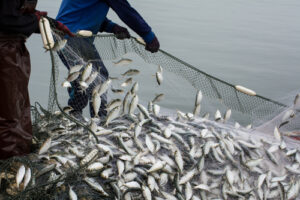
To improve fisheries management across the country, U.S. Rep. Garret Graves (R-LA) and U.S. Sen. Roger Wicker (R-MS) led a bipartisan, bicameral contingent of lawmakers in requesting that the National Oceanic and Atmospheric Administration (NOAA) modernize the data used by the National Marine Fisheries Service (NMFS).
“Historically, the federal government’s fisheries data management has been a failure,” Sen. Wicker said on April 24. “Their system overestimates what has been caught, which gives us less opportunity to fish.”
“We know that there’s better and more precise fisheries management data being collected by the states than what the federal government can provide, and we want NMFS to use the best data and science,” added Rep. Graves. “Our children and grandchildren deserve sound science and sustainable fisheries management.”
Sen. Wicker, Rep. Graves, and their colleagues are concerned about “consistent issues” with NMFS’s fishery dependent and independent surveys, according to an April 18 letter they sent to Janet Coit, NOAA’s assistant administrator for fisheries.
For instance, while these are nationwide issues, the lawmakers noted that specific events — such as inaccurate catch estimates made earlier this year at the Tampa-based Gulf of Mexico Fishery Management Council — highlight “just how much of a mess current management has become.”
The council is one of several that manage federal waters. Members are appointed by state governors and they work to make sense of staff-driven, computer-modeled data that purportedly provides the best available scientific information to guide decisions on fishing seasons and allowable catches.
However, the NMFS continues to use the federal Marine Recreational Information Program Fishing Effort Survey (MRIP-FES) as the best scientific information available, despite NMFS’s own pilot study estimating that MRIP-FES “significantly overestimates” fishing effort by as much as 40 percent, according to the lawmakers’ letter.
“This is causing premature fishery closures across the country, limiting both economic and recreational opportunities,” wrote Rep. Graves, Sen. Wicker, and their colleagues.
The 24 lawmakers who signed the letter urged NOAA to work with them, as well as the U.S. Senate Commerce, Science, and Transportation Committee and the U.S. House Natural Resources Committee, to improve the data used for management, and to rebuild confidence and trust with the American public.
Among the lawmakers who joined Sen. Wicker and Rep. Graves in signing the letter were U.S. Sen. Bill Cassidy (R-LA) and U.S. Reps. Buddy Carter (R-GA), Brian Mast (R-FL), and Mary Sattler Peltola (D-AK).
“State-led surveys produce the best available science and lead to the best possible decisions for the species off our coast,” Rep. Graves said. “The federal government’s assessments are erroneous and inaccurate and flounder in comparison to the data collected by the five Gulf States.”
Sen. Wicker added that “real solutions” exist to reverse this trend. “It’s up to the federal government to listen, incorporate states’ data, and, in turn, give Mississippi’s anglers more chances to catch red snapper,” he said.



